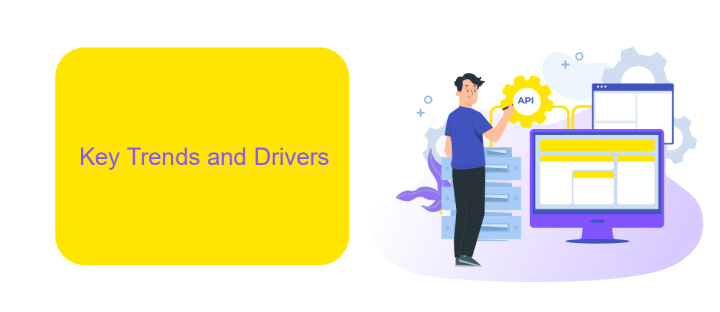Low-Code No-Code Market
The Low-Code No-Code market is revolutionizing the way businesses approach software development by enabling users with minimal coding expertise to create robust applications. This paradigm shift is democratizing technology, empowering a broader range of professionals to contribute to digital transformation initiatives. As the demand for rapid, cost-effective solutions grows, the Low-Code No-Code market is poised for exponential expansion.
Market Overview
The Low-Code No-Code market is experiencing rapid growth as businesses seek to accelerate digital transformation and reduce dependency on traditional software development. This market empowers non-technical users to create applications through intuitive interfaces and pre-built templates, significantly reducing development time and costs.
- Increased demand for automation and efficiency
- Growing need for digital solutions across industries
- Rising adoption of cloud-based services
- Enhanced focus on customer experience and personalization
One of the key drivers in this market is the integration of various services and applications. Tools like ApiX-Drive facilitate seamless integration by allowing users to connect different platforms effortlessly, streamlining workflows and enhancing productivity. As a result, businesses can leverage these technologies to innovate faster and remain competitive in an ever-evolving digital landscape.
Key Trends and Drivers

The Low-Code No-Code (LCNC) market is experiencing rapid growth driven by the increasing demand for faster and more efficient application development. Businesses are seeking ways to reduce their reliance on traditional coding, enabling non-technical users to create and modify applications. This democratization of software development is a key trend, allowing organizations to innovate and respond to market needs more swiftly. Additionally, the integration capabilities offered by platforms like ApiX-Drive are enhancing the LCNC ecosystem, enabling seamless connectivity between various applications and services without extensive coding knowledge.
Another significant driver is the rising need for digital transformation across industries. Companies are under pressure to modernize their operations, and LCNC platforms provide a cost-effective solution to achieve this. The flexibility and scalability of these platforms make them ideal for both small businesses and large enterprises. Furthermore, the ongoing advancements in artificial intelligence and machine learning are being incorporated into LCNC tools, further expanding their functionalities and making them more powerful and user-friendly. As a result, the LCNC market is poised for continued expansion, driven by these technological innovations and the growing demand for agile development solutions.
Market Segmentation

The Low-Code No-Code market is segmented based on various criteria including application, deployment mode, organization size, and industry vertical. This segmentation helps in understanding the diverse needs and preferences of different market segments, thereby enabling tailored solutions and strategies.
- Application: Platforms are categorized by their use cases such as web development, mobile application development, and business process automation.
- Deployment Mode: Solutions are divided into on-premise and cloud-based deployments, offering flexibility and scalability to businesses.
- Organization Size: The market caters to small and medium-sized enterprises (SMEs) as well as large enterprises, each with unique requirements and budgets.
- Industry Vertical: These platforms serve various industries including healthcare, finance, retail, and manufacturing, addressing specific industry needs.
Additionally, integration services like ApiX-Drive play a crucial role in this market by enabling seamless connectivity between different applications and systems. This enhances the functionality and efficiency of Low-Code No-Code platforms, making them more versatile and user-friendly.
Competitive Landscape

The Low-Code No-Code market is rapidly evolving, driven by the increasing demand for agile and efficient software development solutions. This market is characterized by intense competition among key players who offer diverse platforms catering to different business needs. Companies are striving to differentiate themselves through unique features, user-friendly interfaces, and robust integration capabilities.
Major players in this space include industry giants and innovative startups, each bringing their own strengths and specialties. These platforms are designed to empower non-technical users to create applications with minimal coding, thereby accelerating digital transformation across various industries.
- Microsoft Power Apps
- OutSystems
- Mendix
- Appian
- ApiX-Drive
ApiX-Drive stands out by offering seamless integration services that connect various applications and automate workflows without the need for complex coding. As businesses continue to seek efficient and scalable solutions, the competitive landscape of the Low-Code No-Code market will likely see further innovation and consolidation.


Future Outlook
The future of the Low-Code No-Code market looks promising as businesses continue to seek efficient ways to develop applications with minimal technical expertise. With the rise of citizen developers, organizations are increasingly adopting these platforms to accelerate digital transformation and reduce dependency on traditional IT departments. This shift not only fosters innovation but also allows for quicker adaptation to market changes and customer needs.
Moreover, the integration capabilities of Low-Code No-Code platforms are expected to improve significantly. Tools like ApiX-Drive are playing a crucial role in this evolution by enabling seamless integration between various applications and services. As these platforms become more sophisticated, they will offer enhanced automation, better user experiences, and more robust security features. This will empower businesses of all sizes to streamline operations, reduce costs, and stay competitive in an ever-evolving technological landscape.
FAQ
What is Low-Code/No-Code development?
Who can benefit from Low-Code/No-Code platforms?
What types of applications can be built using Low-Code/No-Code platforms?
How do Low-Code/No-Code platforms handle integrations with other systems?
Are Low-Code/No-Code platforms secure?
Apix-Drive will help optimize business processes, save you from a lot of routine tasks and unnecessary costs for automation, attracting additional specialists. Try setting up a free test connection with ApiX-Drive and see for yourself. Now you have to think about where to invest the freed time and money!

